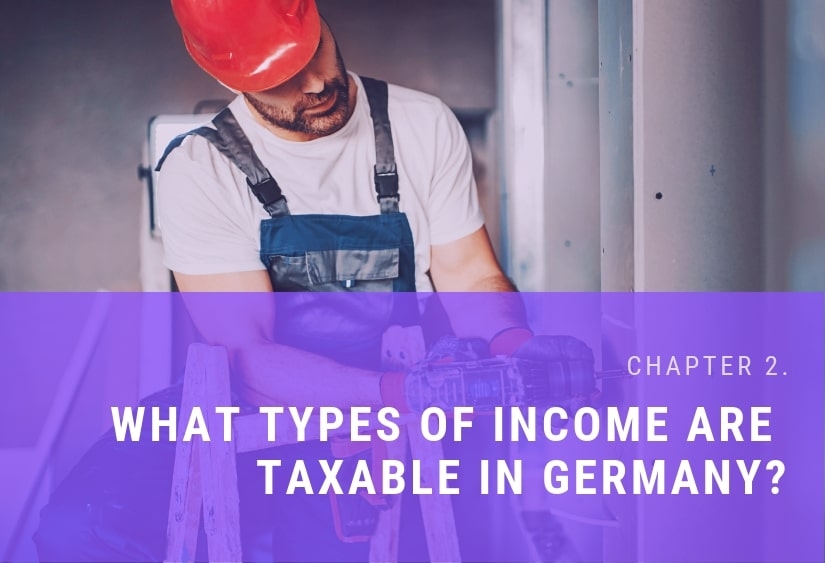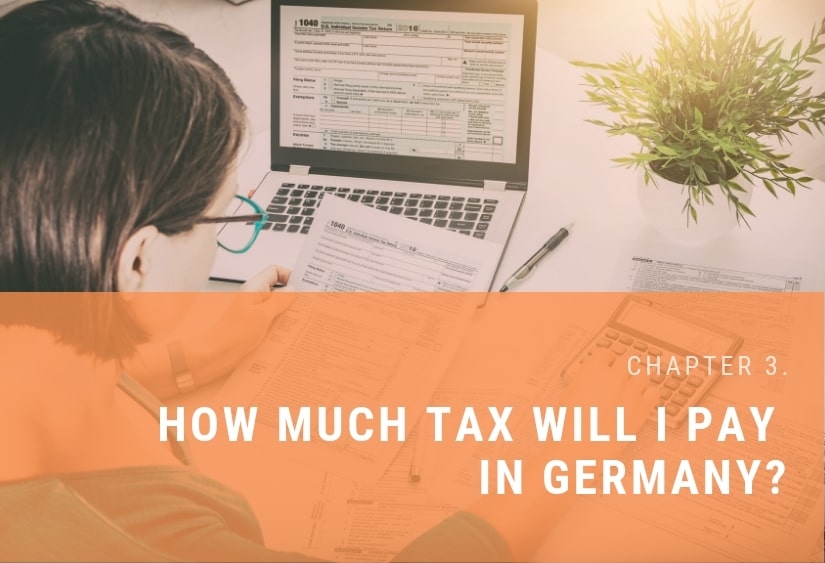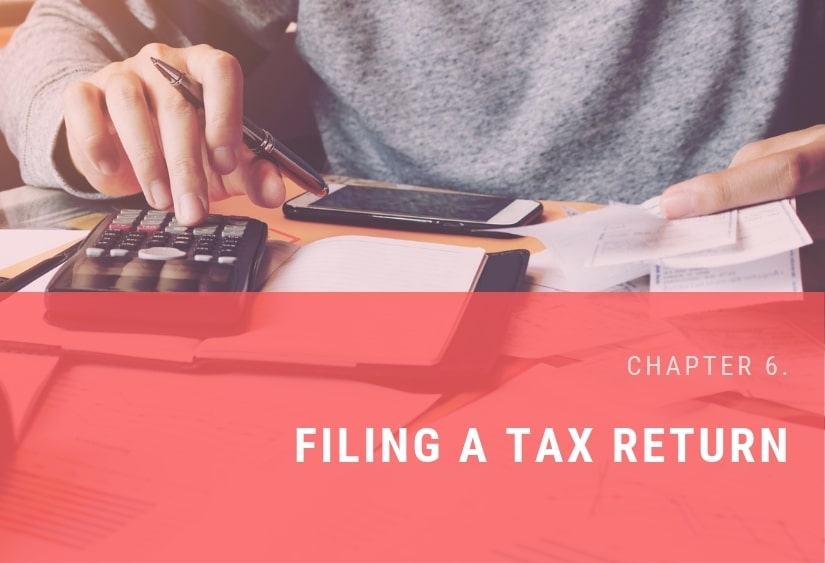Your Bullsh*t-Free Guide to Taxes in Germany
Introduction to tax in Germany
Are you moving to Germany to work?
Venturing to a new country is always an exciting experience.
And as you pack your bags and catch your flight, it’s likely that tax will be the furthest thing from your mind.
But coming to terms with the local tax system is a big part of settling into a new country.
And like any tax system, there’s a lot to know about Germany's.
That’s why we’ve created this handy guide which breaks down everything you need to know about the German tax system!
Download your FREE German Tax Guide

The basics
The first thing to know about the German tax system is that any income you earn in Germany will be subject to income tax. However, you may be entitled to a refund at the end of the tax year.
Lohnsteuer (income tax) alone accounts for a 3rd of the German government's revenue and is deducted directly from your wages by your employer.
Your employer may take into account a deduction for children in your care or treat you as a married couple when calculating your Lohnsteur, but if you failed to provide these details, you may be entitled to claim part of your Lohnsteuer after the tax year ends on 31 December.
You can claim your refund by filing your income tax return.
Want help filing your German tax return?
Income from other sources, including self-employment, fees for services, rent collections, investments etc are covered by the Einkommensteuer (income tax).
In the following chapters, we’ll simplify your tax obligations and entitlements while you are working in Germany.
The guide will cover:
- How much tax you’ll pay
- Claiming your German tax refund
- Filing a German tax return
- And much morei
So let’s get started!
Chapter 1: Starting work in Germany

Tax number documents
Two tax number documents will be assigned to you when you arrive to work in Germany.
1. Identifikationsnummer (also called Steuer ID or Tax ID)
The Steuer ID is your personal identification number. It is only issued once and is unique to you. This is your personal tax ID number for the rest of your life and is given to you when you register.
This number will be used to identify you by the Finanzamt (tax office).
You must include your Steuer ID on all letters to the Finanzamt (and is used to process everything regarding Einkommensteuer (Income Tax).
It is created randomly and doesn’t give away any personal information.
2. Tax Number:
You need you a Steuernummer number for tax settlements, if you are a freelancer or an entrepreneur.
To start a career in one of these professions, a Steuernummer is necessary and you must apply for it at the local Finanzamt (tax office). Without it, you cannot conduct accounting or issue invoices to your clients.
This document states your circumstances such as marital status, number of kids or religion. It holds your profile as a taxpayer that’s linked to your tax number.
If you move to a different city or city district or change from employee to self-employed, this number can change.
If you’re self-employed, your Steuernummer will be used in numerous cases, whenever communicating with the tax authorities (the Finanzamt); paying your VAT for the month, paying your local trade tax, or income tax. You also use it to do a Germany tax return.
If you have income from employment only, you can submit your first tax declaration without a tax number. The tax office will then automatically issue one for you and inform you about this. You should use this tax number in the following years unless your situation changes (moving to another address, change in marital status, having income from other sources, etc).
The Average German Tax Refund is €1020

How to get your Steuernummer?
You will receive this number once you register (or Anmeldung) in Germany. This simple process involves registering your stay in Germany at a specific address.
After registering at your local registration office, you will receive an Anmeldungbescheinigung (registration confirmation).
Every German citizen or newcomer in Germany is required to register within 14 days after moving to a new house or flat.
The Central Tax Office in Germany will normally send your tax ID automatically to your registered address within a few weeks after you’ve registered at the registration office.
If you lose your tax ID
If you lose your tax ID, you can ask for it at the tax office and they will help you retrieve it. Be sure to bring your passport to the tax office with you.
To register when you have your new address in Germany simply:
● Bring your ID
● Bring your tenancy or sublet contract. If you’re staying somewhere temporarily while looking for something more permanent, have them write and sign a letter stating that you are staying with them. Here is a sample.
● Bring confirmation that you’ve moved in from your landlord or fill in a form called “Anmeldung bei einer Meldebehörde”, you’ll get at the entrance of any Bürgeramt (citizen’s office).
● Depending on the area you live, there is a different Bürgeramt where you can go and take care of your administrational requirements.
Your Tax ID will also help you when you file a tax return, claim a refund or change jobs.
Your employer will need to know your Tax ID when you start working for them. However, you will be afforded some time, after you start work to provide the required documents.
Want help filing your German tax return?
Chapter 2. What types of income are taxable in Germany?

Are you wondering what types of income are taxable in Germany?
Types of taxable income in Germany:
- Trade and business activities
- Agriculture and forestry
- Income from capital investments
- Employment (including salary from previous employment)
- Independent services
- Income from royalties
- Other income (profit from private transactions, alimony, pension, etc.)
- Income from the rental of real estate and certain movable property
Interest, dividends and capital gains on shares are subject to a fixed tax rate of 25% plus solidarity tax.
Some types of income are exempt from taxation but are taken into account when determining your tax rate, such as unemployment benefits, maternity benefits and certain income earned in other countries under double taxation agreements.
Your tax liability towards German income tax also determines your residence status.
Regardless of whether you are resident or non-resident for tax purposes, only your income from Germany will be taxed. Your income from outside Germany will only be used to determine your tax rate.

So how do I know if I am resident or non-resident for tax purposes?
Generally, you'll be considered a resident of Germany if you have a ‘domicile’ there or spend more than 6 consecutive months in Germany (habitual place of abode).
A domicile is a home or dwelling owned by or rented to the taxpayer who has full control over the property. A habitual place of abode is established if you're physically present in Germany on a long-term basis (more than 6 months).
So in other words, you'll be considered non-resident if you spend less than 6 consecutive months in Germany.
Non-residents (limited income tax liability) can be considered and taxed as German residents (unlimited tax liability) if:
- At least 90% of their total worldwide income in a calendar year is subject to German income tax
- OR their income from outside Germany in a calendar year does not exceed €10,908 in 2023, and €11,604 for 2024. These amounts are to be reduced where necessary and appropriate in light of the conditions in the taxpayer’s country of residence.
Extended business travellers are likely to be considered non-residents of Germany for tax purposes unless they stay in the country for more than 6 months in a row (brief interruptions like weekend trips home are disregarded).
German-sourced employment income is generally treated as German-sourced where you perform services while physically present in Germany.
Still wondering what your residency status is in Germany?
If you're still confused by your residency status, you can email us at info@taxback.com or chat to our friendly team members at www.taxback.com/chat. We’ll be happy to help you figure out your German tax status!
The Average German Tax Refund is €1020
Chapter 3: How much tax will I pay in Germany?

Tax Rates
The first €10,908 (or €21,816 for married couples filing jointly) you earn is tax-free. From January 2024, this amount will increase to €11,604 (or €23,208 for married couples).
Any amount earned above €10,908 in 2023 or €11,604 in 2024 is taxable.
The income tax rates in Germany for 2024 are as follows:
| Taxable income | Tax Rate |
| Up to €11,604 | 0% |
|
€11,604 - €66,760 |
14% - 42% |
| €66,760 - €277,825 |
42% |
| From €277,825 | 45% |
Like income tax, everyone must also pay solidarity tax (Solidaritätszuschlag or "Soli"), which is limited to 5.5% of income tax. It was introduced to improve the economic situation and infrastructure in the 5 'new' eastern regions of Germany.
This additional tax is a percentage of all individual income taxes.
In 2024, a single taxpayer with income up to €18,130 is exempt from paying solidarity tax (€17,543 in 2023). If you are a married couple filing jointly, the limit for 2024 is €36,260 (€35,086 in 2023).
In addition, various deductions are possible which may reduce the amount of tax payable.
There are no local or state income taxes levied in Germany.
Want help filing your German tax return?
Your payslip
To find out exactly how much tax you pay on your income, you can look at your payslip. Typical deductions you may see on your payslip include:
Lohnsteuer: Amount of income tax payable on your salary. This will be one of the biggest deductions from your salary.
RV/Rentenversicherung: This is a deduction for pension insurance. It is allocated to retired employee pensions and basic income for anyone no longer deemed fit to work through incapacity. This is not for your own individual pension plan. Instead it is paid by the working population to sustain today’s retirees.
Participation is mandatory for employees, with each worker assessed for a sum based on annual earnings. In 2023 the premium is 9.3% of your gross monthly salary and both you and your employer will contribute this amount.
If you’ve worked and paid contributions in Germany for more than 60 months, you’ll get a German pension after reaching the official German pensionable age.
If you're a citizen of a country outside the European Union and you have paid into a German pension fund, once you have been out of Germany for at least 2 years, you can apply for a refund of your German pension payments.
The Average German Tax Refund is €1020
Taxback customers get an average pension insurance refund of €5,410 from Germany.
To be eligible to claim a German pension refund, you must be a resident of a non-eu country (excluding Turkey, Israel and the former Yugoslavian states) and must have paid contributions into the German Pension Fund for less than 60 months (5 years).
KV/Krankenversicherung: This is the German health insurance. If you’re publicly insured, there is a 50/50 split between employer and employee contributions.
The general contribution rate to the statutory health insurance is 14.6% of the monthly gross income. So you contribute 7.3% of your gross income and your employer pays 7.3% of your gross income.
If you’re privately insured, you’ll see AG-Zuschuss (or similar) as a line on your payslip representing your employer’s 50% contribution towards your private healthcare costs.
This isn’t deductible from your gross pay so the employer contribution is added to your gross salary, thus enabling you to pay this in one monthly direct debit to your health insurance company.
If you work in Germany as a fulltime employee, contributions are generally non-negotiable and payment is automatic.
PV-Pflegeversicherung: The amount that will be deducted from your wages for this type of insurance varies between 1.7% and 2.8% depending on the province and your family status. Everyone who has statutory health insurance is automatically contributing to the social nursing care insurance as well. Those with private health insurance must take out private nursing care insurance.
AV-Arbeitslosenversicherung: This is unemployment insurance and is mandatory for all employees in Germany. It’s deducted at source from your salary and as a rule, your employer pays half of the contribution, you’ll pay the other half.
The contribution is 2.6% of your gross taxable income, so you’ll pay 1.3% and your employer will pay 1.3% on your behalf each month.
If you were insured in Germany for at least 12 of the last 30 months, you are entitled to unemployment benefits of 60% of your previous net salary.
You are due unemployment benefits, known as Arbeitslosengeld I for a period of 1 year, if you have paid insurance for at least 24 months, if you however have paid insurance for more than 12 months, but less than 24 months you can receive Arbeitslosengeld I for 6 months only.
Berufsunfallversicherung: Occupational accident insurance. Unfallverischerung, or Berufsunfallversicherung is also part of the German statutory social security system. It ensures employees for injuries or illnesses that occur at the workplace as well as during the commute to and from the workplace.
Your tax class
Your tax class in Germany dictates how you are taxed.
The "Tax Class" (Lohnsteuerklasse or Steuerklasse) helps determine the amount of withholding (income) tax deducted from your salary as well as the value of a number of social benefits for which you may be eligible.
Your tax class will be assigned to you by the authorities based on marital status and other criteria.
There are 6 tax classes in Germany:
- Single workers
- Single employees who have a child who entitles them to child relief
- Married employees (or widowed within the first year after the death of their spouse). The spouse who earned a higher income is in tax class III.
- Married employees - both work/earn income and their incomes are similar
- Married employees where there is a large difference in the remuneration of both spouses. The spouse who earns less will be in tax class V.
- When the employee has not provided the employer with a Lohnsteuerkarte or does not have it at all.
Even if a person has been treated as single but is actually married, this can be corrected on their tax return. The main reason why it is worth filing a joint return is the fact that the tax-free amount for married couples is twice as high as for single people.
Want help filing your German tax return?
Chapter 4: Social security contributions in Germany
If you work fulltime in Germany, then you’ll have to pay social security contributions.
The working population of Germany is in effect paying for the current costs of people in need of benefits, for example, pensioners, sick people, the unemployed, etc.
Compulsory social security contributions consist of:
● Pension insurance (Rentenversicherung)
● Unemployment insurance (Arbeitslosenversicherung)
● Health insurance (Krankenversicherung)
● Nursing insurance for disability and old age (Pflegeversicherung)
In Germany, these contributions are typically shared by the employer and employee equally.
Social insurance contributions rates-turn into table
Your employer withholds your share from your wages and you’ll see them on your payslip each time you’re paid.
Rates for 2024
| Employer Contribution | Employee Contribution | |
| Health Insurance | 7.3% | 7.3% |
| *Long-term care insurance | 1.7% | 1.7 |
| Pension and Disability Insurance | 9.3% | 9.3% |
| Unemployment Insurance | 1.3% | 1.3% |
*Only applies to people without children and those living in a province other than Sachsen.
Transfer of contributions to access benefits
When you’re working in Germany, your employer will deduct various insurance contributions (health, unemployment, pension, etc.) and transfer them to the relevant German fund.
Later on, when you return to your home country, you might need to prove that you paid social insurance contributions abroad in order to receive unemployment or other social benefits in your home or any other EU/EEA country.
To do this you can provide your local social security service with the certified U1 form.
Contact Taxback if you need help to get the U1 Certificate from Germany.
It’s also an excellent way to protect your social contributions and connect them to your country of permanent residence.
The Average German Tax Refund is €1020
Chapter 5: Benefits in Germany

Anyone employed in Germany that earns more than €450 per month is automatically part of the social security system in Germany.
Expats can also participate in the system to a large degree and the social contributions deducted from your salary may make you eligible for certain benefits such as:
● Unemployment Benefit
● Health benefits
● Pension
Child Benefit - Kindergeld
Working in Germany gives you access to a range of benefits. One type of such benefit is ‘Kindergeld’.
Kindergeld is a childcare benefit paid by the German state to parents who are working in Germany and have children. It’s also paid when children stay abroad in any EU/EEA country.
Foreigners living in Germany can also apply for Kindergeld as long as they have a valid residency permit. However, residents of EU/EEA countries do not need a residence permit to apply for the benefits.
You may be entitled to claim the childcare benefit if:
- You work/worked in Germany
- You are an EU/EEA citizen
- You have a permanent residence permit.
Even if you worked and lived in Germany but your child/children did not, you may still be able to claim the benefit.
Parents can be entitled to Kindergeld:
a) if their normal place of abode is, or they are normally habitually resident in, Germany
b) if the parents do not have permanent residence in Germany and do not usually live here, they can still apply for family allowance provided that they are subject to 'unlimited tax liability' in Germany in accordance with § 1 Abs. 3 EStG
People who are unlimited liable for tax purposes in Germany (usually live in Germany) or those who have requested to be treated as unlimited liable for tax (90% of their income comes from Germany OR their income from home country is not higher than the amount specified by the German government are entitled for Kindergeld.
Citizens of European Union and European Economic Area countries, as well as Swiss citizens, are entitled to family benefits from Germany.
As of 2023, the amount of Kindergeld you receive is fixed at €250 per month per child, no matter how many children you have.
If your child is not residing with you in Germany, but in any other EU/EEA country the amount of the German childcare benefit is reduced with the amount of the childcare benefit due in the country of residence.
Find out more about childcare benefit in Germany.
Want help filing your German tax return?

If you are a parent, adoptive parent, or spouse who provides a home for a stepchild, or a grandparent who provides a home for grandchildren, or provides a home for stepchildren, you may also be entitled to Child Benefit.
The benefit is paid by the German government to cover part of the costs of raising children. It is usually made by bank transfer to the applicant's account.
If your child earns more than €10,908 per year, or if you stop working or leave Germany, you will not be entitled to Kindergeld.
Please note: you can only apply for Kindergeld for up to 6 months back. The date of receipt of the application at the office will be decisive. This means that the later you send it, the later it will be received by the German authorities and the fewer months you will be able to receive the benefit.
Please contact us as soon as you start working in Germany so that we can get you the maximum amount possible.
Unemployment Benefit
Unemployment insurance is mandatory for all employees in Germany and is deducted at source from your salary.
If you have worked in Germany for at least 12 months, you are entitled to unemployment benefits of 60% of your previous net salary. You are due unemployment benefits, known as Arbeitslosengeld I for a period of 1 year, if you have paid insurance for at least 24 months. However, if you have paid insurance for more than 12 months, but less than 24 months you can receive Arbeitslosengeld I for 6 months only.
You’ll be entitled to unemployment benefit if:
- Have registered at the labour office and have applied for unemployment benefit
- Don't have a job or work less than 15 hours p/w
- Are available for work
- Are actively seeking to end your unemployment, e.g. writing applications and going to job interviews when invited by an employer, and
- Have completed the qualifying period to claim unemployment benefits, i.e. you must have been paying contributions for at least 12 months of the 30 months before being unemployed.
Pension insurance in Germany makes sure you get paid pension once you retire. The amount of pension depends on how much you’ve paid into the German pension insurance scheme over your lifetime. You’re also eligible to your spouse/civil partner’s pension if they die before you.
Self-employed people and civil servants are exempt from statutory pension insurance. They usually have private pension schemes in Germany.
If you only work even just a few years in Germany, then you also may be eligible to claim your pension benefits after you return to your home country, if you’re an Non-EU citizen.
Most Germans also have a private pension plan to make sure they won’t have financial worries once old age arrives.
Expats are also eligible to get into private schemes and often continue to pay them, even if they go abroad again.
Germany has one of the best healthcare systems in the world, providing its residents with comprehensive health insurance coverage.
If your gross salary in Germany is less than €66,600 per year, (or €5,550 per month in 2023) then membership in the Government Health Insurance System (GKV) is mandatory.
The medical benefits include in-patient care at your nearest hospital, outpatient care with registered doctors (Kassenarzte) and basic dental care.
With government health insurance, there is no coverage for private doctors or surgeons, a private room in hospital, alternative/homeopathic medical care, dental subsidies beyond the very basics, and vision products for adults or any medical benefits outside of Europe.
Your non-working dependents living at your address in Germany are insured at no additional cost and simply need to be registered with the same Krankenkasse as the paying member.
The Average German Tax Refund is €1020
Chapter 6: Filing a Tax Return
In Germany, the tax year runs concurrently with the calendar year.
If you are legally obliged to file a tax return, then you should file with the local tax authorities after the end of the tax year – which is 31 December. The deadline to submit the tax return is typically 31 July and automatically extended to 28 February the second year after the tax return is prepared by a tax professional.
Otherwise, you have four years to submit a tax return. For example, your 2019 tax return can be submitted until 31 December 2023.
After filing, the tax return is reviewed by the tax authorities and once the review is finalised, an assessment notice is sent out.
As in many other countries, Germany allows a variety of deductions that can lower taxable income.
Deductions are granted for circumstances such as children under 18, specified insurance premiums, charitable and political contributions to German entities up to certain limits and unavoidable extraordinary expenses above a certain limit.
Work-related expenses like work clothing or travel to work, double household including relocation costs, travel tickets and rental costs, as well as unavoidable extraordinary expenses above a certain limit (such as illness).
Deductions from compensation are also made for four social programs: retirement, unemployment, health insurance and long-term nursing care.
Payments for these programs are normally paid equally by employer and the employee. The employer's share of contributions isn’t considered as taxable income to the employee and the employee's portion is tax deductible up to a certain limit.
At Taxback, we can tell you more about other deductions and the requirements to earn them.
Do I need to file a tax return?
See frequently asked questions at the end of the article.
Want to file a return to benefit from specific tax allowances?
If you have overpaid tax or want to avail of any deductions, then you must file your tax return with the relevant tax office within 4 years of the end of the calendar year.
At Taxback, we’ve been helping people who have worked in Germany claim their income tax refunds since 1996!
Am I due a tax refund in Germany?
You may be due a tax refund in Germany even if you don't realise it. See frequently asked questions at the end of the article for more information.
Joint filing
Tax rates for married couples in Germany are lower, so it’s worthwhile filing a joint tax return. Your spouse doesn’t even have to have travelled to Germany with you.
If you’re an EU or EEA resident and your spouse stayed at home when you were working in Germany, you can still apply jointly.
If you didn’t file a joint tax return but want to get all of the tax benefits for married couples in Germany, you should contact Taxback. We can file an amendment of your tax return which may be beneficial to both you and your spouse.
German Pension Refunds (Rentenversicherung)
If you're a resident of a non-European Union country and have worked in Germany, you may have paid into a pension fund.
Pension Insurance Contributions (Rentenversicherung) in Germany are usually 9.3% of your salary and if you’ve been out of Germany for at least 2 years, we can help you get all your pension payments refunded.
Taxback customers get an average pension insurance refund of €5,410 from Germany.
To be eligible to claim a German pension refund, you must be outside Germany for at least 2 years, you must be a resident of a non-EU country (excluding Turkey, Israel and the former Yugoslavian states) and you must have paid contributions into the German Pension Fund for less than 60 months (5 years).
We can apply for unclaimed German pension refunds for as far back as 1994 so it can be very lucrative.
Seafarers
People sailing on vessels bearing the German flag are usually taxed as single taxpayers even though they may have family in their home country.
If you're sailing on a ship and being paid through a German company, we can review your taxes and check if you’re due a German tax refund for Seafarers.
Expenses for professional education and renewal of sailing related certificates can also be claimed so it’s well worth checking what you’re owed.
Want help filing your German tax return?

Frequently Asked Questions
Q. If I work in Germany, do I need to file an income tax return?
A. If you work in Germany as an employee and this is the only income you earn, you don’t need to file a tax return because it's taken at source. There are exceptions, e.g. when income tax is deducted simultaneously by multiple employers.
However, if you want to claim any allowances or a refund of overpaid tax you should file a tax return.
If you’re self-employed in Germany then you will need to file an income tax return as well.
Q. How much tax will I pay in Germany?
A. How much tax you pay depends largely on how much you earn.
The tax rate starts from 14% and goes up to 45%.
Q. How do I file my tax return in Germany if I need to?
A. Filing a tax return in Germany can be confusing not least because of different tax legislation and language barriers. The easiest and simplest way to file your tax return is by using Taxback. We can do the paperwork and deal with the authorities on your behalf.
Q. Am I due a tax refund in Germany?
A. You may be due a tax refund if:
● Your annual income was under the tax-free allowance
● You worked part-time or had a temporary job in Germany
● You were not correctly classified for tax payments
● You financially supported your parents or other dependants in your home country
● You paid rent in both Germany and your home country
● You paid for flights to and from Germany
● You incurred work-related expenses such as travel costs
● You paid pension insurance
● You are married, but were taxed as single
● You had work-related expenses that were not covered by your employer
The average Germany tax refund is €1,020. The easiest way to find out if you’re due a tax refund is by applying with Taxback. We can check on your behalf and our policy is no refund, no fee.
Q. What is the tax return deadline in Germany?
A. The deadline is 31 July of the following year for people who are obliged by law to submit one. However, you can request an extension if required. You can also get an extension if you use a tax agent like Taxback.
If not obliged, you have four years to submit your tax return.
Q. If I am owed a refund, how long will it take?
A. It can take up to 6 months for the Finanzamt to process your files and obtain your tax refund in Germany on your account.
Q. What documents do I need to file a tax return?
A. You’ll need your:
Lohnsteuerbescheinigung – this is your annual document confirming your income and tax paid. You will receive it from your employer.
Identifikationsnummer – 11-digit unique identification number
Steuernummer – If you filed your tax return in the previous year, you can find this number on your tax decision (Steuerbescheid) received from the Finanzamt
EU/EEA certificate from your home country tax authorities confirming the amount you earned outside of Germany, in case you haven't spent the whole year in Germany
Power of attorney: authorising us to represent you in front of the German tax authorities
Q. I have income from outside Germany, how do I avoid double-taxation?
A. If you want to file an income tax return, you have to declare your worldwide income. The worldwide income will determine the tax rate which is used to tax the German income. But your income from outside Germany will not be taxed in Germany.
Q. Can I get a refund of pension contributions?
A. You may be eligible to get a refund of your pension contributions. If you're a resident of a non-European Union country and have worked in Germany, you may have paid into a pension fund.
Once you have been out of Germany for at least two years, we can apply to get all your pension payments refunded. Taxback customers get an average pension insurance refund of €5,410 from Germany.
To be eligible to claim a German pension refund, you must be a resident of a non-EU country (excluding Turkey, Israel and the former Yugoslavian states) and you must have paid contributions into the German Pension Fund for less than 60 months (5 years).
Q. Can I claim Kindergeld?
A. If you have children and you work in Germany, you may be entitled to claim Kindergeld. Kindergeld is the state benefit given to parents of children in Germany.
Foreigners living in Germany can also apply for Kindergeld (child benefits) as long as they have a valid residency permit. Residents of EU/EEA countries do not need a residence permit to apply for the benefits.
Residents of Switzerland are also entitled to claim child benefits in Germany.
Even if you worked and lived in Germany but your child/children did not, you may still be able to claim the benefit.
Note:
As mentioned above, you can claim childcare benefits for only 6 months back in time. The date when the application is received will be taken into consideration. Which means that the later you send it, the later it will be received by the German authorities and the less months you will be able to apply for.
Contact our tax team as soon as you start working in Germany so that we can claim the maximum amount for you.
Q. What is a U1 Form?
A. When you work in Germany, your employer will deduct various insurance contributions (health, unemployment, pension, etc.) and transfer them to the relevant fund.
Later on when you return to your home country you might need to prove that you have paid social insurance contributions abroad in order to receive unemployment or other social benefits in your home or any other EU/EEA country.
In order to do this you will need to provide your certified U1 form to your local social security service.
Please note that the periods of social insurance and employment in Germany will be taken into account when calculating your unemployment benefit in your home country.
It’s also an excellent way to protect your social contributions and connect them to your country of permanent residence.
Want help filing your German tax return?
Q. I am married, should I file a joint tax return?
A. Tax rates in Germany for married or jointly assessed couples are significantly lower than the rates for single taxpayers, so it’s worth checking if you’re able to make a joint application with your spouse.
Employees in Germany can pay up to 45% income tax on their earnings. In most cases, you can claim back a significant amount of this. The refund amount is likely to be higher if you’re married and filing jointly due to a higher tax-free allowance for married people.
What’s more, your spouse doesn’t even have to have travelled to Germany with you. If you’re an EU or EEA resident and your spouse stayed at home when you were working in Germany, you can still apply jointly.
We work with a lot of people who didn’t initially inform the German Tax Office that they were married and were subsequently taxed incorrectly.


